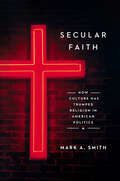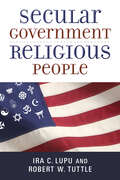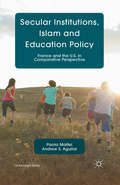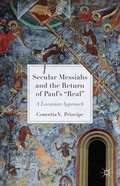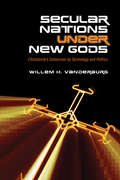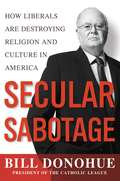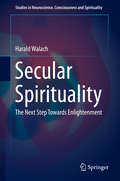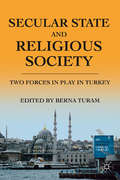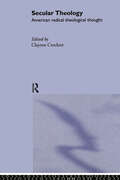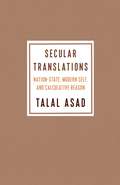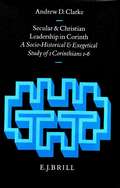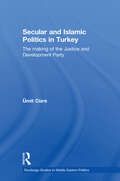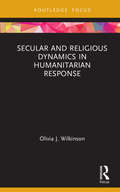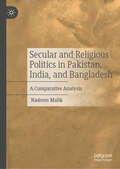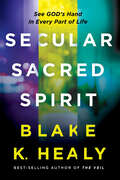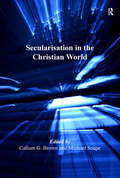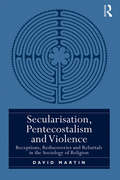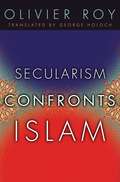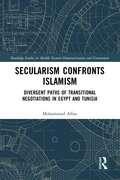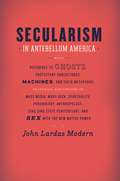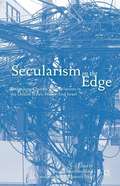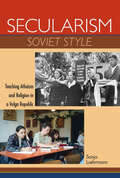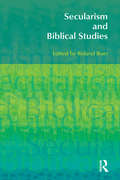- Table View
- List View
Secular Faith: How Culture Has Trumped Religion in American Politics
by Mark A. SmithWhen Pope Francis recently answered “Who am I to judge?” when asked about homosexuality, he ushered in a new era for the Catholic church. A decade ago, it would have been unthinkable for a pope to express tolerance for homosexuality. Yet shifts of this kind are actually common in the history of Christian groups. Within the United States, Christian leaders have regularly revised their teachings to match the beliefs and opinions gaining support among their members and larger society. Mark A. Smith provocatively argues that religion is not nearly the unchanging conservative influence in American politics that we have come to think it is. In fact, in the long run, religion is best understood as responding to changing political and cultural values rather than shaping them. Smith makes his case by charting five contentious issues in America’s history: slavery, divorce, homosexuality, abortion, and women’s rights. For each, he shows how the political views of even the most conservative Christians evolved in the same direction as the rest of society—perhaps not as swiftly, but always on the same arc. During periods of cultural transition, Christian leaders do resist prevailing values and behaviors, but those same leaders inevitably acquiesce—often by reinterpreting the Bible—if their positions become no longer tenable. Secular ideas and influences thereby shape the ways Christians read and interpret their scriptures. So powerful are the cultural and societal norms surrounding us that Christians in America today hold more in common morally and politically with their atheist neighbors than with the Christians of earlier centuries. In fact, the strongest predictors of people’s moral beliefs are not their religious commitments or lack thereof but rather when and where they were born. A thoroughly researched and ultimately hopeful book on the prospects for political harmony, Secular Faith demonstrates how, over the long run, boundaries of secular and religious cultures converge.
Secular Government, Religious People
by Ira C. Lupu Robert W. TuttleIn this book Ira Lupu and Robert Tuttle break through the unproductive American debate over competing religious rights. They present an original theory that makes the secular character of the American government, rather than a set of individual rights, the centerpiece of religious liberty in the United States.Through a comprehensive treatment of relevant constitutional themes and through their attention to both historical concerns and contemporary controversies — including issues often in the news — Lupu and Tuttle define and defend the secular character of U.S. government.
Secular Institutions, Islam and Education Policy: France and the U.S. in Comparative Perspective (St Antony's Series)
by P. Mattei A. AguilarAmidst claims of threats to national identities in an era of increasing diversity, should we be worried about the upsurge in religious animosity in the United States, as well as Europe? This book explores how French society is divided along conflicts about religion, increasingly visible in public schools, and shows the effect that this has had.
Secular Messiahs and the Return of Paul’s "Real"
by Concetta V. PrincipeConsidering that secularism was designed to erase the influence of religion from the public sphere, the use of the messiah in secular texts begs the question: Why does the religious trope recur? Following from this point of inquiry, this book posits that the messiah in secularism can be understood as the 'return of the repressed' and, as such, may be read as symptomatic of trauma. According to psychoanalyst Jacques Lacan, trauma indicates the 'encounter with the Real', where the 'Real' is so inexplicable that it is visible only in what returns to haunt the subject: the objet a. But if the messiah may be seen as the objet a, then what is the source of this traumatic return? Principe engages with the limitations of answering this question with the aim of circumscribing a field of exploration: is there a relation between the modern use of the messiah and the earliest witness to the term in Paul's letters of his encounter with Christ? And what is the relation between Paul's Christianity and secularism? In other words, what of Paul's 'Real' returns in the twentieth century?
Secular Nations under New Gods: Christianity’s Subversion by Technology and Politics
by Willem H. VanderburgThe ongoing political muscle-flexing of diverse Christian communities in North America raises some deeply troubling questions regarding their roles among us. Earlier analyses including Herberg’s Protestant, Catholic, Jew showed that these three branches of the Judaeo-Christian tradition correspond to three forms of the American way of life; while Kruse’s One Nation Under God showed how Christian America was shaped by corporate America. Willem H. Vanderburg’s Secular Nations under New Gods proceeds based on a dialogue between Jacques Ellul’s interpretation of the task of Christians in the world and Ellul’s interpretation of the roles of technique and the nation-state in individual and collective human life. He then adds new insight into our being a symbolic species dealing with our finitude by living through the myths of our society and building new secular forms of moralities and religions. If everything is political and if everything is amenable to discipline-based scientific and technical approaches, we are perhaps treating these human creations the way earlier societies did their gods, as being omnipotent, without limits. Vanderburg argues that until organized Christianity becomes critically aware of sharing these commitments with their societies, it will remain entrapped in the service of false gods and thereby will continue to turn a message of freedom and love into one of morality and religion.
Secular Sabotage: How Liberals Are Destroying Religion and Culture in America
by William A. DonohueThis assault is not happening from accident or whim. It is happening because disaffected liberals have deliberately set out to upend our Judeo-Christian traditions. Indeed, they are determined to tear down the traditional norms, values, and institutions that have been part of American society from its founding. The cultural debris that these saboteurs have created will take decades to clean up. In feisty prose Donohue explores our nation where a college student is threatened with expulsion because she prayed on campus, a civil rights organization protests a statue of Jesus found on the ocean floor and a housewife sues a school district to stop the singing of Rudolph The Red-nosed Reindeer at a school choral production. These are just a few examples cited that demonstrate a culture descending into madness. Donohue takes no prisoners as he digs out and exposes the groups behind this all-out attack on our Christian traditions. Among these are the radical atheists, the proponents of multiculturalism, the sexual libertines, the Hollywood elite with their not-so-hidden agenda and lawyers who collaborate for profit.
Secular Spirituality
by Harald WalachThis book discusses spirituality as an emerging scientific topic from a historical perspective, with extensive discussion of the mind-body problem and of scientific concepts of consciousness. While the book focuses on the Western tradition of 'Enlightenment', it also implicitly addresses the double meaning of the term, with the Eastern tradition describing it as 'a state of true knowledge, which is an important goal on an individual's spiritual path' and the Western tradition seeing it as 'the collective process of getting rid of narrow-minded dogmas and concepts'. The book is based on a simple yet challenging premise: Science has not gone far enough in the scientific process of going from a collective mind tied up in dogmatic teachings to a truly free mind that, seemingly, freed itself from bondage and restrictions. The book shows that science, and with it our whole Western culture, has to incorporate spirituality if it is to realize this goal of enlightenment. If that is done, and it can only be done by many individuals actually practicing spirituality, this will also lead to the individual type of enlightenment.
Secular State and Religious Society: Two Forces in Play in Turkey
by Berna TuramOn the basis of original, empirically rich, and theoretically sound social research, the chapters in this volume reveal and analyze the complex relations between the secular government of Turkey and the religious persons and society within the Turkish state.
Secular State and Religious Society: Two Forces in Play in Turkey
by Berna TuramOn the basis of original, empirically rich, and theoretically sound social research, the chapters in this volume reveal and analyze the complex relations between the secular government of Turkey and the religious persons and society within the Turkish state.
Secular Theology: American Radical Theological Thought
by Clayton CrockettSecular Theology brings together new writings by some of America's most influential theological and religious thinkers on the viability of secular theology. Critically assessing Radical Orthodoxy and putting American radical theology in context, it provides new resources for philosophical theology.Themes covered include postmodern theology, ethics, psychoanalysis, the death of God and medieval theology.
Secular Translations: Nation-State, Modern Self, and Calculative Reason (Ruth Benedict Book Series)
by Talal AsadIn Secular Translations, the anthropologist Talal Asad reflects on his lifelong engagement with secularism and its contradictions. He draws out the ambiguities in our concepts of the religious and the secular through a rich consideration of translatability and untranslatability, exploring the circuitous movements of ideas between histories and cultures.In search of meeting points between the language of Islam and the language of secular reason, Asad gives particular importance to the translations of religious ideas into nonreligious ones. He discusses the claim that liberal conceptions of equality represent earlier Christian ideas translated into secularism; explores the ways that the language and practice of religious ritual play an important but radically transformed role as they are translated into modern life; and considers the history of the idea of the self and its centrality to the project of the secular state. Secularism is not only an abstract principle that modern liberal democratic states espouse, he argues, but also a range of sensibilities. The shifting vocabularies associated with each of these sensibilities are fundamentally intertwined with different ways of life. In exploring these entanglements, Asad shows how translation opens the door for—or requires—the utter transformation of the translated. Drawing on a diverse set of thinkers ranging from al-Ghazālī to Walter Benjamin, Secular Translations points toward new possibilities for intercultural communication, seeking a language for our time beyond the language of the state.
Secular and Christian Leadership in Corinth: A Socio-Historical and Exegetical Study of 1 Corinthians 1-6
by Andrew D. ClarkeThis volume traces the influences of first century Corinthian secular leadership on local church leadership as reflected in 1 Corinthians 1-6. It then shows how Paul modifies the Corinthian understanding of church leadership. By comparing secular leadership in first century Corinthian society with leadership in the Corinthian church, it has been argued that one of Pauls major concerns with the church in Corinth is the extent to which significant members in the church were employing secular categories and perceptions of leadership in the Christian community. This volume has adopted the method of assessing the New Testament evidence in the light of its social and historical background. Both literary and non-literary sources, rather than modern sociological models, were employed in making the comparison.
Secular and Islamic Politics in Turkey: The Making of the Justice and Development Party (Routledge Studies in Middle Eastern Politics #6)
by Ümit CizreTurkey is ninty-nine per cent Muslim, its ruling party, Justice and Development Party (JDP), comes from but denies its Islamist pedigree and has a very secular feel. However, the deeply secular regime distrusts the JDP with regard to its 'true' colours. This book makes sense of these paradoxical perceptions which have characterized Turkey’s politics since the JDP has come to power in 2002. The key momentum for shaping the nature and trajectories of the ruling party of Turkey since 2002, the JDP, has been the ‘identity’ question. The JDP’s commitment to transform Turkey’s politics was part of its engagement to remake its own identity. The JDP’s adoption of a conservative-democrat identity has rested on a new understanding of Westernization, secularism, democracy and the role and relevance of Islam in politics. The book’s central problematic is to explain both the politics of change the JDP initiated and sustained in the first three years in office and the politics of retreat it has made from its reformist discourse since 2005. The book analyzes not just the catalysts for its reformist discourse of the first 3 years but tries to explain its reversal to an inward-looking conservative nationalist course. By approaching this topical debate from the conceptual stance rather than a party-centered approach, Ümit Cizre identifies that the change the JDP has initiated within Turkey’s political Islam and in Turkish politics is the product of an interactive process between many levels, actors, forces and historical periods. The forces and actors covered include: global forces of Islam the secular establishment and its popular extensions the past and present Islamic actors in political and non-political spheres the changing balance of forces in the region which frame the EU and the US policies toward the JDP. Secular and Islamic Politics in Turkey is a valuable contribution to the study of globalization and ‘change’ in contemporary political Islam, the relationship between religion and politics, and secularism and political Islam. As such, it will be of interest to students and researchers alike in the area of Islamic politics, democratization, European Union and political Islam, and globalization.
Secular and Religious Dynamics in Humanitarian Response (Routledge Research in Religion and Development)
by Olivia J. WilkinsonThis book investigates the ways in which the humanitarian system is secular and understands religious beliefs and practices when responding to disasters. The book teases out the reasons why humanitarians are reluctant to engage with what are seen as "messy" cultural dynamics within the communities they work with, and how this can lead to strained or broken relationships with disaster-affected populations and irrelevant and inappropriate disaster assistance that imposes distant and relatively meaningless values. In order to interrogate secular boundaries within humanitarian response, the book draws particularly on qualitative primary data from the aftermath of Typhoon Haiyan in the Philippines. The case study shows how religious practices and beliefs strongly influenced people's disaster experience, yet humanitarian organisations often failed to recognise or engage with this. Whilst secularity in the humanitarian system does not completely exclude religious participation and expression, it does create biases and boundaries. Many humanitarians view their secularity as essential to their position of impartiality and cultural sensitivity in comparison to what were seen as the biased and unprofessional beliefs and practices of religions and religious actors, even though disaster-affected people felt that it was the secular humanitarians that were less impartial and culturally sensitive. This empirically driven examination of the role of secularity within humanitarianism will be of interest to the growing field of "pracademic" researchers across NGOs, government, consultancy, and think tanks, as well as researchers working directly within academic institutions.
Secular and Religious Politics in Pakistan, India, and Bangladesh: A Comparative Analysis
by Nadeem MalikThis book thoroughly explores the complex relationship between secularism and religious politics in South Asia. It examines the historical and contemporary factors that have influenced the political landscapes of Pakistan, India, and Bangladesh, focusing on how colonial legacies, nation-building processes, and religious ideologies have shaped governance and social structures. Through comparative analysis, the book delves into the rise of Hindutva in India, the struggle between secularism and Islamism in Bangladesh, and the role of Islam in Pakistan's politics. By integrating diverse theoretical perspectives and historical contexts, this book offers a comprehensive understanding of the evolving nature of secularism and religious politics in these three nations. It also provides insights into the broader implications for democracy, pluralism, and religious freedom in South Asia. This book is essential reading for scholars, policymakers, and anyone interested in the intersection of religion and politics in one of the world's most complex and dynamic regions.
Secular, Sacred, Spirit: See God's Hand in Every Part of Life
by Blake K. HealyThe spiritual realm affects everyday life in ways we&’ve never imagined! This book will revolutionize your understanding of how the spiritual and physical worlds connect with one another so you can strategically live out kingdom purposes in all areas of your life. Since Blake Healy was a child, he has seen angels, demons, and other spiritual realities. He sees them with the naked eye as clearly as anything else. In his latest book, he gives readers a peek behind the veil as he shows them how the physical and spiritual realms connect. Known for his rich storytelling and vivid descriptions, Healy takes readers on a journey through everyday events—a trip to a grocery store, a family dinner, a busy workday—and helps them see how what is happening in the spirit is affected by the way we live our daily lives. In the end, readers will:Gain a clearer understanding of how the spirit realm operatesUnderstand that their actions have spiritual consequencesLearn how the Father, Son, and Holy Spirit can guide them into having a heavenly effect wherever they go. See God&’s hand in every part of your life!
Secularisation in the Christian World: Understanding Secularisation, 1800-2000 (Christianity And Society In The Modern World Ser.)
by Michael SnapeThe power of modernity to secularise has been a foundational idea of the western world. Both social science and church history understood that the Christian religion from 1750 was deeply vulnerable to industrial urbanisation and the Enlightenment. But as evidence mounts that countries of the European world experienced secularising forces in different ways at different periods, the timing and causes of de-Christianisation are now widely seen as far from straightforward. Secularisation in the Christian World brings together leading scholars in the social history of religion and the sociology of religion to explore what we know about the decline of organised Christianity in Britain, Europe, the United States, Canada and Australia. The chapters tackle different strands, themes, comparisons and territories to demonstrate the diversity of approach, thinking and evidence that has emerged in the last 30 years of scholarship into the religious past and present. The volume includes both new research and essays of theoretical reflection by the most eminent academics. It highlights historians and sociologists in both agreement and dispute. With contributors from eight countries, the volume also brings together many nations for the first consolidated international consideration of recent themes in de-Christianisation. With church historians and cultural historians, and religious sociologists and sociologists of the godless society, this book provides a state-of-the-art guide to secularisation studies.
Secularisation, Pentecostalism and Violence: Receptions, Rediscoveries and Rebuttals in the Sociology of Religion
by David MartinIn this book David Martin brings together a coherent summary of his many years of ground-breaking academic work on the sociology of religion. Covering key and contentious areas from the last half-century such as secularisation, religion and violence, and the global rise of Pentecostalism, it presents a critical recuperation of these themes, some of them first initiated by the author, and a review of their reception history. It then reviews that reception history in a way that discusses not only the subjects themselves, but also the academic practices that have surrounded them. As such, this collection is vital reading for all academics with an interest in David Martin’s work, as well as those involved with the sociology of religion and the study of secularisation more generally.
Secularism Confronts Islam
by Olivier RoyThe denunciation of fundamentalism in France, embodied in the law against the veil and the deportation of imams, has shifted into a systematic attack on all Muslims and Islam. This hostility is rooted in the belief that Islam cannot be integrated into French-and, consequently, secular and liberal-society. However, as Olivier Roy makes clear in this book, Muslim intellectuals have made it possible for Muslims to live concretely in a secularized world while maintaining the identity of a "true believer." They have formulated a language that recognizes two spaces: that of religion and that of secular society.Western society is unable to recognize this process, Roy argues, because of a cultural bias that assumes religious practice is embedded within a specific, traditional culture that must be either erased entirely or forced to coexist in a neutral, multicultural space. Instead, Roy shows that new forms of religiosity, such as Islamic fundamentalism and Christian evangelicalism, have come to thrive in post-traditional, secular contexts precisely because they remain detached from any cultural background. In recognizing this, Roy recasts the debate concerning Islam and democracy. Analyzing the French case in particular, in which the tension between Islam and the conception of Western secularism is exacerbated, Roy makes important distinctions between Arab and non-Arab Muslims, hegemony and tolerance, and the role of the umma and the sharia in Muslim religious life. He pits Muslim religious revivalism against similar movements in the West, such as evangelical Protestantism and Jehovah's Witnesses, and refutes the myth of a single "Muslim community" by detailing different groups and their inability to overcome their differences. Roy's rare portrait of the realities of immigrant Muslim life offers a necessary alternative to the popular specter of an "Islamic threat." Supporting his arguments with his extensive research on Islamic history, sociology, and politics, Roy brilliantly demonstrates the limits of our understanding of contemporary Islamic religious practice in the West and the role of Islam as a screen onto which Western societies project their own identity crisis.
Secularism Confronts Islamism: Divergent Paths of Transitional Negotiations in Egypt and Tunisia (Routledge Studies in Middle Eastern Democratization and Government)
by Mohammad AffanThis book provides in-depth examination of the recent confrontation between Islamists and secularists in Egypt and Tunisia. Presenting a new approach to understand Islamism and secularism, the research addresses the variables that could affect the outcome of transitional negotiations. The secularist-Islamist conflict proved to be a major hindrance for democratisation and a main source of political instability in the Middle East. During the Arab Spring, disputes between both political trends sparked shortly after getting rid of their common enemy: the autocratic rulers. First, they disagreed on how to lead the transitional period. Then, polarisation grew deeper with the political competition in the parliamentary and presidential elections and the ideological disagreements during the drafting of the constitution. Eventually, this conflict put Tunisia at a verge of civil strife in the summer of 2013 and led to collapse of the transitional process in Egypt after the military coup. Examining the causes of the conflict between the secularists and the Islamists during the transitional period, the work provides new insights from the Arab Spring experience. Updating the transition literature, the book is a key resource to academics and students interested in democratization theory and Middle East politics.
Secularism In Antebellum America
by John Lardas ModernGhosts. Railroads. Sing Sing. Sex machines. These are just a few of the phenomena that appear in John Lardas Modern's pioneering account of religion and society in nineteenth-century America. This book uncovers surprising connections between secular ideology and the rise of technologies that opened up new ways of being religious. Exploring the eruptions of religion in New York's penny presses, the budding fields of anthropology and phrenology, and Moby-Dick, Modern challenges the strict separation between the religious and the secular that remains integral to discussions about religion today. Modern frames his study around the dread, wonder, paranoia, and manic confidence of being haunted, arguing that experiences and explanations of enchantment fueled secularism's emergence. The awareness of spectral energies coincided with attempts to tame the unruly fruits of secularism--in the cultivation of a spiritual self among Unitarians, for instance, or in John Murray Spear's erotic longings for a perpetual motion machine. Combining rigorous theoretical inquiry with beguiling historical arcana, Modern unsettles long-held views of religion and the methods of narrating its past.
Secularism On The Edge
by Jacques Berlinerblau Sarah Fainberg Aurora NouWhat is secularism, and why does it matter? In an era marked by global religious revival, how do countries navigate the presence of faith in the public square? In this dynamic collection of essays, leading scholars from around the world, including Israeli novelist A. B. Yehoshua and French female rabbi Delphine Horvilleur, examine the condition of church-state relations in three pivotal countries: the United States, France, and Israel. Their analyses are rooted in a wide variety of disciplines, ranging from ethnography and demography to political science, gender studies, theology, and law. Prominent among the points addressed are the crippling nomenclatural confusions that have so hampered not only secularism as a political ideology, but secularism as an academic construct. This reader-friendly volume also offers a critical and nuanced look at how women are impacted by secular governance. Though secularism is often equated with modernity and progress, including with regard to gender equality, our contributors find that the truth is infinitely more complicated.
Secularism Soviet Style: Teaching Atheism And Religion In A Volga Republic (New Anthropologies of Europe)
by Sonja LuehrmannSonja Luehrmann explores the Soviet atheist effort to build a society without gods or spirits and its afterlife in post-Soviet religious revival. Combining archival research on atheist propaganda of the 1960s and 1970s with ethnographic fieldwork in the autonomous republic of Marij El in Russia's Volga region, Luehrmann examines how secularist culture-building reshaped religious practice and interreligious relations. One of the most palpable legacies of atheist propaganda is a widespread didactic orientation among the population and a faith in standardized programs of personal transformation as solutions to wider social problems. This didactic trend has parallels in globalized forms of Protestantism and Islam but differs from older uses of religious knowledge in rural Russia. At a time when the secularist modernization projects of the 20th century are widely perceived to have failed, Secularism Soviet Style emphasizes the affinities and shared histories of religious and atheist mobilizations.
Secularism and Biblical Studies (BibleWorld)
by Roland BoerWhat is secular biblical criticism? 'Secularism and Biblical Studies' presents a selection of essays that examine the nature of secular biblical studies and its hermeneutical principles. The essays outline and analyse debates within biblical studies over the issue of secularism and explore the interplay of atheism, agnosticism and faith in the interpretation of the Bible. The book argues for a hermeneutics of suspicion and a wider engagement with cultural, literary and anthropological disciplines. Examining biblical hermeneutics from a range of perspectives - from Europe, Israel and the USA - 'Secularism and Biblical Studies' offers a provocative and challenging approach that will be of interest to all students and scholars of the Bible.
Secularism and Freedom of Conscience
by Charles Taylor Jocelyn MaclureSecularism: the definition of this word is as practical and urgent as income inequalities or the paths to sustainable development. In this wide-ranging analysis, Jocelyn Maclure and Charles Taylor provide a clearly reasoned, articulate account of the two main principles of secularism—equal respect, and freedom of conscience—and its two operative modes—separation of Church (or mosque or temple) and State, and State neutrality vis-à-vis religions. But more crucially, they make the powerful argument that in our ever more religiously diverse, politically interconnected world, secularism, properly understood, may offer the only path to religious and philosophical freedom. Secularism and Freedom of Conscience grew out of a very real problem—Quebec’s need for guidelines to balance the equal respect due to all citizens with the right to religious freedom. But the authors go further, rethinking secularism in light of other critical issues of our time. The relationship between religious beliefs and deeply-held secular convictions, the scope of the free exercise of religion, and the place of religion in the public sphere are aspects of the larger challenge Maclure and Taylor address: how to manage moral and religious diversity in a free society. Secularism, they show, is essential to any liberal democracy in which citizens adhere to a plurality of conceptions of what gives meaning and direction to human life. The working model the authors construct in this nuanced account is capacious enough to accommodate difference and freedom of conscience, while holding out hope for a world in which diversity no longer divides us.
